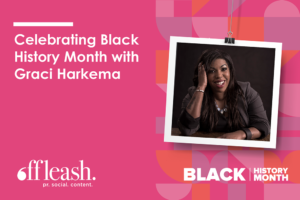Celebrating Black History Month with Graci Harkema

Today marks the first day of Black History Month; a time that honors the achievements and sacrifices made by the Black community. Although this important month became officially observed by the United States in 1976, the origins of Black History Month date back to 1915. To celebrate Black History Month, we spoke with DEI leader Graci Harkema (who recently led a training for Offleash) to learn what this month means to her.
What does Black History Month mean to you?
Black History Month means a celebration of Black culture, Black excellence, and Black legacy. It’s a time to highlight and amplify Black voices and Black lives.
Growing up, who were your sources of inspiration or people that you looked up to?
I grew up in a very homogenous area and didn’t have many Black people in my life, in fact there weren’t any that I knew very closely. I always looked forward to celebrating Black History Month at school. It was a time where Black excellence was at the forefront of our daily lives.
Black people who inspired me were those I read about in books and saw on TV. I gravitated towards strong, Black women in history, like Harriet Tubman. I was drawn to her bravery in risking her own life in order to help give others freedom… a life of their own.
Presently, one of my greatest sources of inspiration is my biological mother. Due to civil unrest, malnutrition, and disease, I was adopted from Africa at a young age. After thinking my biological mother was dead for my entire life, just over six years ago, I discovered she was alive and met her for the first time. Like Harriet Tubman, my biological mother risked her life in order to give me life. My daily aspiration is to live a legacy of courage and bravery, just like Harriet Tubman and my biological mother, MariJani.
What advice do you have for aspiring Black professionals who are leading efforts for a more equitable workplace?
The African proverb which rings in my mind is, “If you want to go fast, go alone. If you want to go far, go together.” Finding, creating, and maintaining equitable work environments isn’t easy. The work truly takes a village. Find your tribe and align yourself with allies who you trust and who are willing to risk and share their privileges for equity and equality.
I’ve been able to find success in part because I’ve had inclusive leaders and allies who support and believe in me enough to speak up and share their access with me so that together, we could reach new heights in inclusion, collaboration, teamwork, and productivity in our work environments.
How can we all be better allies to each other?
There are so many ways we can be an ally. It begins with showing up and being present. Being an ally means intentionally listening to others and seeking to understand. Being an ally is about showing support, speaking up, and using our platforms and voices for others with less access or privilege.
We can also volunteer or join committees for causes we want to support. We can mentor or sponsor someone with less access. We can invest our time and talents to support communities and causes we want to make a stand for. We can vote and use our dollars to back causes we care about.
How powerful do you think storytelling is when it comes to DEI efforts?
Storytelling is very powerful in DEI efforts. I like to leverage storytelling in my DEI work with clients because it helps make the importance of the work become real to folks who don’t naturally see the business case for diversity, equity, and inclusion. We didn’t get to this place historically, societally, systemically, and institutionally because of one sole person.
The work of embracing diversity in our identities, backgrounds, and perspectives in addition to creating inclusive and equitable spaces where we can belong while living and working as our authentic selves, is the responsibility of all of us. When we use storytelling, our audiences are able to see themselves in the story and see themselves having a role in making their world around them more equitable.
Although Black History Month is a key moment in time, it’s a reminder that Black lives should be celebrated every single day. It’s up to all of us to work together, lift each other up, and stand up for one another.
For more on Graci Harkema, visit graciharkema.com or follow her on Instagram at @thegracihakema.